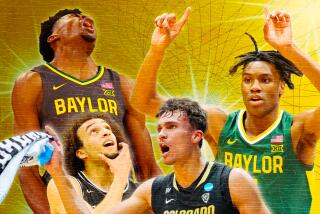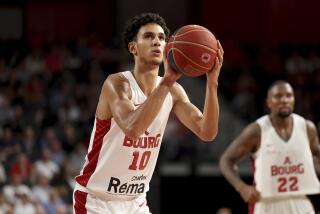The NBA / Sam McManis : Plenty of Trades, but Did Anybody Make a Really Good Deal?
- Share via
Either National Basketball Assn. teams are being run by a group of procrastinators, or these power brokers simply work better under deadline pressure.
How else to explain the annual flurry of movement in the final days before the league-imposed trading deadline, preceded by months of inactivity and posturing? At least one long-rumored trade was consummated. An elaborate deal involving as many as four teams was scrubbed. And a few trades seem to have been made simply for the sake of change. Speculators have subsisted for months on talk of the fates of Mark Aguirre, Kiki Vandeweghe, Adrian Dantley, Herb Williams, Benoit Benjamin and others long believed to be changing uniforms and addresses.
Now, at last, a summing up. Bearing in mind that the full impact of a trade will not be felt for perhaps three seasons, and that some were made simply with this spring’s playoffs in mind, here is an analysis:
Mark Aguirre from Dallas to Detroit for Adrian Dantley.
Right now, this one still is a toss-up, but it obviously looks a lot better for the Mavericks now that Dantley has ended his holdout for contract renegotiation.
Despite a poor debut with Dallas on Friday night, Dantley could be categorized as an older version of Aguirre, in ability and attitude. His 32-point effort Saturday night proves he can score as prolifically as Aguirre, and any negative influence he might spread in the locker room cannot be any more harmful than Aguirre’s.
Detroit, it seems, is taking a bigger gamble. Last season, with Dantley, the Pistons came close to beating the Lakers for the championship. Many have speculated that Aguirre’s acquisition will spoil the Pistons’ chemistry.
As Maverick forward Sam Perkins said of Aguirre last week: “I will never understand Mark--his tactics, his ways, his moodiness. Maybe he does have a chemical imbalance.”
But if Isiah Thomas can make Aguirre, his close friend, play to potential, the trade could seal the championship for the Pistons.
Herb Williams from Indiana to Dallas for Detlef Schrempf.
Maverick General Manager Norm Sonju, obviously a biased observer, told Dallas writers: “(The Pacers) may have made the worst trade in the history of the NBA.”
That is overstating things a bit, but the Mavericks certainly seem to have gotten the better of this trade. Williams is a 32-year-old power forward with chronic bad knees, but he has averaged more than 12 points and eight rebounds this season and will soothe the loss of Roy Tarpley to drug rehabilitation.
With Williams and Dantley, the Mavericks are clearly a better team than before the trading deadline and could make a playoff run, after all.
Schrempf, chosen eighth overall in the 1985 draft, is an underachieving small forward. He has joined the Pacers, who already have a fine small forward, Chuck Person. Unless Person moves to big guard, Schrempf will be, at best, a sixth man.
Wayman Tisdale from Indiana to Sacramento for LaSalle Thompson and Randy Wittman.
The Pacers seemingly got the better of this deal, at least. Thompson is a dependable, if unspectacular center in whom the Lakers might have been interested after this season. Wittman is a decent shooting guard returning to his home state.
Tisdale, meanwhile, has rivaled the Clippers’ Benjamin for biggest bust of the 1985 draft. Selected second overall, one spot ahead of Benjamin, Tisdale has never developed into a consistent, quality player. He is starting at power forward for the Kings, scoring about 17 points a game, but not exerting himself inside.
Danny Ainge and Brad Lohaus to Sacramento from Boston for Joe Kleine and Ed Pinckney.
The Celtics apparently have realized that just surviving until Larry Bird’s return will not be enough.
They desperately needed a backup big man for Robert Parish and Kevin McHale, both averaging close to 40 minutes a game.
In Kleine, they get a player they hope will be reminiscent of Greg Kite, who made significant contributions a few seasons ago. Pinckney will be used as a small forward off the bench, and Reggie Lewis figures to move to a big guard upon Bird’s return.
What the Celtics give up is their only shooting guard. Rookie Brian Shaw has successfully replaced Ainge in every area but shooting, but Bird’s return may ease that strain.
Having traded both centers, the Kings will start 6-10 Jim Petersen in that position, with the 7-foot Lohaus as his backup, meaning that their already vulnerable inside game will be further weakened. But the Kings are now a good perimeter team, with Ainge and rookie Ricky Berry.
Asked about the Kings trading both centers, Kleine said: “I was surprised by that. But you have to give (the Kings) credit for having the guts to try something.”
Kiki Vandeweghe to New York for a 1989 first-round draft choice.
It took the Knicks about six months to consummate this trade, but General Manager Al Bianchi’s patience and maneuvering were eventually rewarded.
The Knicks, essentially, gave up little for a lot. Their first-round draft choice this season probably will fall about 25th, which basically amounts to a second-round pick. A team already deep with sharp-shooting guards, the Knicks will greatly benefit from Vandeweghe’s outside shooting. Providing him enough playing time may be the only problem.
Portland’s only benefit is shedding a player who obviously was unhappy. The Trail Blazers would rather have not made this trade.
As originally planned, Vandeweghe would have gone to the Pacers, Williams to the Atlanta Hawks, the Hawks’ first-round pick to Portland, which then would have acquired Ricky Pierce from Milwaukee for a first-round pick and forward Mark Bryant. But Vandeweghe basically refused to go to Indiana.
The ability of Vandeweghe and Dantley to dictate which teams they would play for has disturbed some club executives.
“Some of the conduct by Aguirre, Vandeweghe and Dantley has been outrageous,” Hawk General Manager Stan Kasten said. “Players and agents are trying to dictate what happens in this league. That stinks.”
The end of Mike Dunleavy’s comeback with the Milwaukee Bucks may have been of interest to American Airlines.
Dunleavy, who won a million-dollar settlement after it was determined an unusual airplane accident caused a career-ending back injury in 1984, was activated from a Buck assistant coach to a player for 10 days because of a rash of injuries.
Dunleavy, 30, played in two games--the final 11 seconds against the Chicago Bulls on Feb. 19 and for four minutes against Indiana at Milwaukee on Feb. 21. In the Pacer game, Dunleavy tried two three-point shots, making one. Every time he touched the ball that game, Milwaukee fans gave him an ovation.
But that proved to be Dunleavy’s last game, since Sidney Moncrief returned last Friday.
“I make one shot, and Sidney comes rushing back,” Dunleavy said jokingly.
Dunleavy suffered a herniated disk when an American Airlines plane carrying the Bucks swerved and braked to avoid a fuel truck while taxiing to the gate at Baltimore’s airport.
Dunleavy, who had his seat belt on at the time, claimed that the accident ended his career and reached the settlement. He told the Milwaukee Journal that he checked to see if his comeback last week might have affected the terms of the settlement. Apparently, it did not.
Fashion note: Denver Nuggets Coach Doug Moe, pressured into wearing a tie this season, has returned to the open-collar look.
“Am I in a beauty contest or what?” Moe asked. “Face it, I’m not out there to look good. . . . It’s not like I’m sitting in an office trying to impress people. Some of these other (coaches) could be strangling, dying and they wouldn’t loosen their ties.”
More to Read
Go beyond the scoreboard
Get the latest on L.A.'s teams in the daily Sports Report newsletter.
You may occasionally receive promotional content from the Los Angeles Times.










